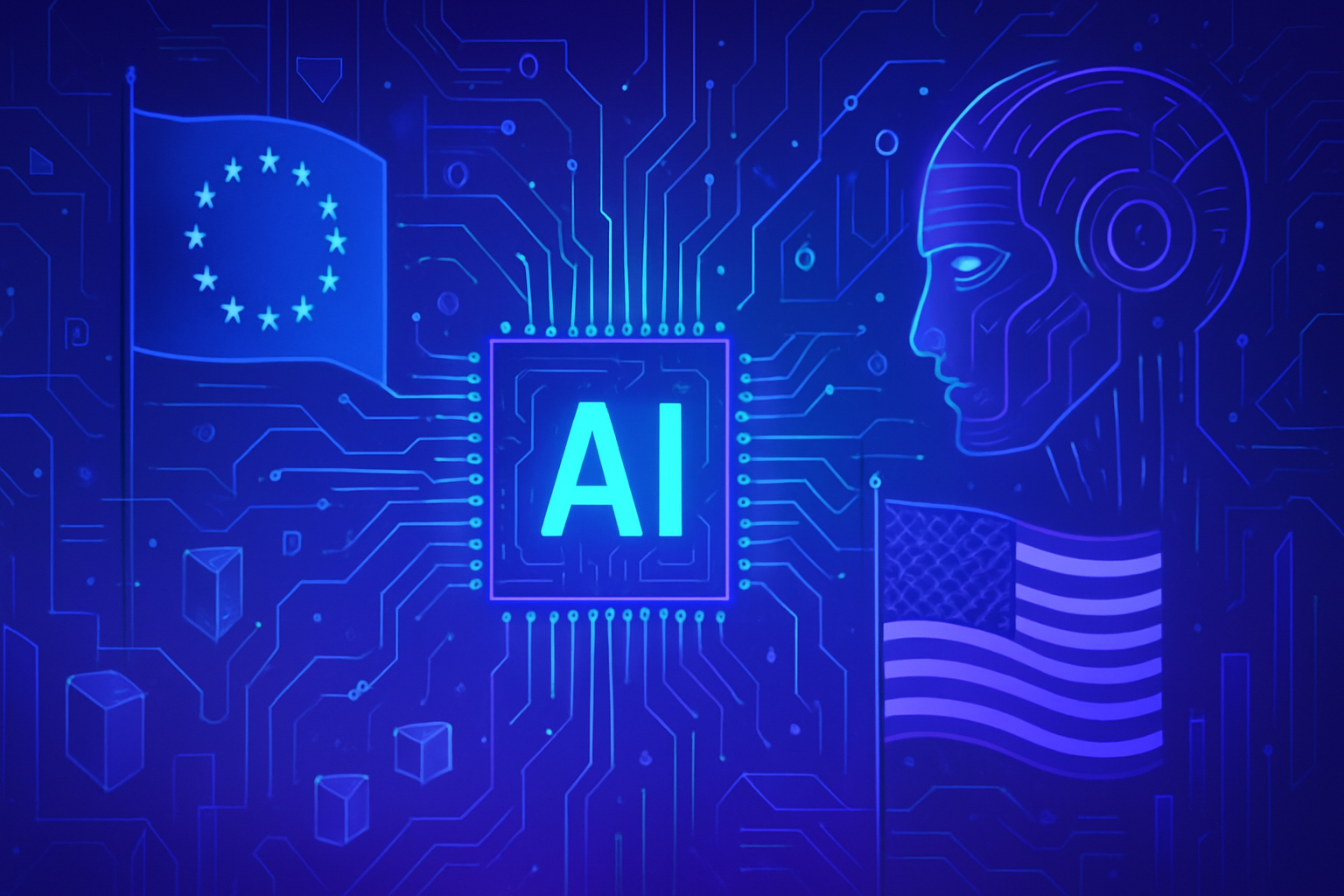The Arrival of the AI Act: A New Challenge for Europe and the United States
The regulation of artificial intelligence is disrupting traditional digital balances. The recently adopted AI Act crystallizes tensions between Europe and the United States, raising crucial questions about governance and innovation. Its implications touch on both ethics and global competitiveness, while American tech giants vigorously oppose this legislation. The challenge lies in establishing a balanced legislative framework capable of fostering innovation while protecting citizens. How will these two powers approach this complex dynamic? The answer will lie in their ability to navigate between
innovation and effective regulation.
The AI Act: A Radical Change for Technological Regulation in Europe
The legislation on artificial intelligence, commonly referred to as the AI Act, is being established in Europe, introducing robust regulation in this rapidly expanding sector. From August 2, certain key provisions of this text will come into force, marking a significant turning point in digital governance. Member States must designate the national authorities responsible for enforcing the new rules, thereby enhancing the oversight of service providers using this technology.
The Stakes of AI Governance
The stakes surrounding the governance of artificial intelligence are numerous. The Twenty-Seven countries must quickly define which institutions will supervise the implementation of these new standards. In France, three entities have been designated: the Directorate General for Competition, Consumer Affairs and Fraud Control (DGCCRF), the National Commission on Informatics and Liberty (CNIL), and the Defender of Rights. This structuring aims to ensure a rigorous application of the provisions of the regulation.
The Reactions of Tech Giants
Alongside the implementation of the AI Act, a coordinated offensive manifests from the American authorities and major tech companies. Washington, in particular, shows hostility towards this strict regulation that aligns with the European conception of digital governance. Major tech companies express concerns about the obligations that would be imposed on them, advocating for a more flexible approach in light of the rapidly evolving market.
The Global Landscape of AI
This new legislative environment could put Europe at the forefront in the field of artificial intelligence. With this regulation, the continent aims to become a model in terms of ethics and safety around AI. The commitment to data protection and user rights is strengthened, contrasting with the more lax practices observed elsewhere. The implications extend beyond mere forecasts: they affect all sectors using this technology.
The Challenges to Overcome
Although this regulation aims to clarify the responsibility of actors, notable challenges remain. Coordination among the different Member States constitutes a major issue, requiring a consensus to avoid disparities in the application of standards. Furthermore, the training of supervisory bodies remains key, as effective oversight requires sharp skills in new AI technologies.
The Consequences for Companies in the United States
American tech companies find themselves at a crossroads. Far from being restricted solely to the European market, they must consider the implications of regulations that could influence their global operations. Developments within the AI Act could set a precedent for compliance, leading to a redefinition of AI integration protocols on a global scale.
Conclusion: A Dynamic to Watch
As the implementation of the AI Act begins to take shape, debates between Europe and the United States on the regulation of artificial intelligence are intensifying. This dynamic resonates with global trends, with unpredictable consequences for technological interconnectedness worldwide.
Frequently Asked Questions About the AI Act: A New Challenge for Europe and the United States
What is the main objective of the AI Act?
The main objective of the AI Act is to regulate the use of artificial intelligence in Europe in order to ensure the safety, transparency, and accountability of AI systems. It also aims to establish a harmonized legal framework for the development and use of AI on the continent.
What will be the consequences of the AI Act for American tech companies?
American tech companies will need to comply with the new regulations if they wish to operate in the European market. This could involve adapting their products and services to meet the safety and ethical standards imposed by the AI Act.
What are the possible sanctions for non-compliance with the AI Act?
Sanctions for non-compliance with the AI Act can include significant financial penalties, restrictions on access to the European market, and even criminal measures in extremely serious cases.
How will the AI Act influence innovation in the technology sector in Europe?
The AI Act could both stimulate and hinder innovation. On one hand, a clear framework can encourage investments in technologies that comply with standards. On the other hand, strict regulations could make it more difficult to deploy certain innovations quickly.
How will European governments ensure the enforcement of the AI Act?
European governments will establish national regulatory bodies to oversee the implementation of the AI Act. These bodies will be responsible for monitoring, risk assessment, and enforcement of AI-related regulations.
What specific governance provisions are established by the AI Act?
The governance provisions include the designation of national authorities to monitor compliance with regulations, as well as a requirement for AI service providers to undergo regular compliance assessments.
How does the AI Act address ethical issues related to artificial intelligence?
The AI Act addresses ethical issues by imposing criteria for transparency and accountability for AI systems, as well as ensuring that users are informed about how their data is used.
What role do the United States play in the context of the AI Act?
The United States play a key role as a global leader in AI development. The dialogue between Europe and the United States is crucial for establishing international standards on AI usage and defining cooperation standards.






